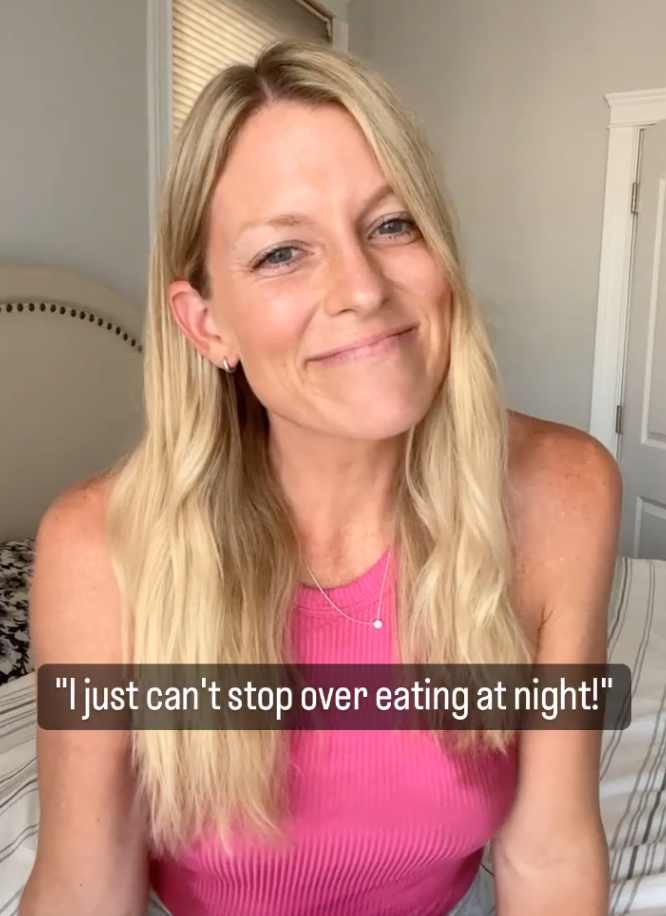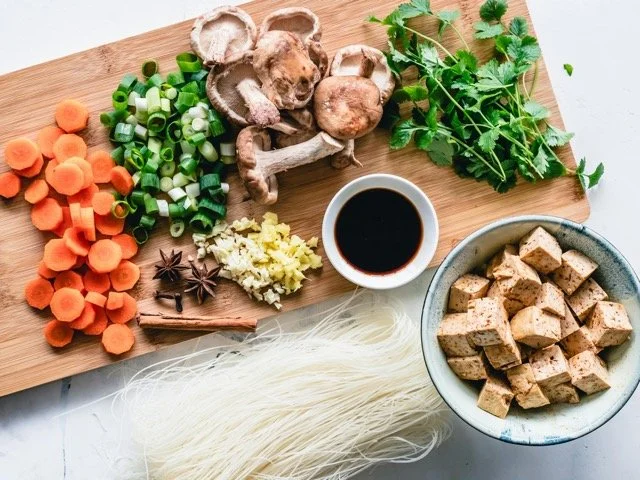THE SIMPLE TRUTH TO YOUR NIGHTTIME OVEREATING
Countless women come to me saying “I just can’t stop overeating at night!”. From here we have to dig deep to get to the roots of the problem before we can change habits and get them on track for their health and weight loss goals (this one major benefit of health coaching!)
Why Do We Overeat?
I get it, it’s so easy to return home from a crazy busy work day exhausted, stressed and mentally fatigued so you find yourself grab snacks before dinner, snacking while you cook dinner and then after dinner somehow a bag of candy, a handful of chocolate covered almonds and a few cookies make their way into your lap as you unwind further from the day watching your favorite series.
It’s not just a you thing, we all do it and there are two main causes that I want to outline below.
The reasons for overeating are actually not shocking, chances are you already know why you’re doing it but life’s demands have caused you to not find the time, or energy, to work on figuring it out. The three feelings above, exhausted, stressed and mentally fatigued are some of the most common emotions that can trigger more than just night time eating which is why they’re crucial to learn how to manage - this is why our style of coaching at Vital Roots Health Co focuses on understanding ‘what got you here’ as one of our first areas to getting you there (to your goals).
The top two most common causes of nighttime overeating stem from:
1. Under-eating throughout the day
2. Unmanaged stress or emotions
Let’s break these down and try to finally understand them and give you some actionable steps to creating change…
First, Under Eating Throughout The Day
Are you under-eating?
This seems to be a very typical food schedule for many:
- 6am: Skip breakfast or just have coffee
- 11:30am: Lunch - Salad and chicken, no dressing or ‘carbs’
- 4pm: Coffee again because you feel an energy dip
- 5:45pm: A few handfuls of pretzels and bites of the fixings for dinner as you make it - 6pm: A light dinner
- 7pm - bedtime: 2 granola bars, half a chocolate bar, popcorn and some more handfuls of whatever else you can find
Sound familiar?
It’s no surprise that at the end of day you are finding it hard to control what, or how much, you are consuming. It makes sense. Overeating can be a biological response to being under-nourished (in amount and/or in nutrients.
It’s not your willpower, it’s your restrictive eating and limited nutrients that makes it really hard to control what you grab for next.
The behavior of overeating isn't the problem. It’s a symptom. The problem is what is causing the overeating.
Some changes that can be made to support the night-time over-eating:
1. Coffee is NOT breakfast. Your body needs fuel to function well and regulate cortisol throughout the day. Start the day with a protein rich breakfast. I love an egg scramble on rye. Or a great grab-and-go option is overnight oats with nuts and berries, no excuse for not having time with this one! Drop me a message on Instagram for my fave recipes!
2. Eat more food in the day and evenly space your meals throughout too.
We’ve covered not skipping breakfast, but if you’re hungry mid-morning, it might be time to eat again (if it's a few hours later). Or maybe your breakfast wasn’t satiating enough; did you get at least 25g of protein and some fiber?
I like to think of snacks as meals too because it really helps to make them well rounded vs just a handful of nuts or dried fruit. It’s helpful to think the week through with your meals before it starts so you have some things on hand.
I have a great recipe for no-bake, protein-packed cookies, make them in bulk and freeze for later! Or try making up some tuna salad, chickpea salad or having some hard boiled eggs, jerky sticks and veggies and hummus set to bring to the office.
3. Make your meals well-rounded, centered around at least 25g of protein and with at least 3 colors each time you eat.
Carbs are not the enemy! If you find yourself bloated or tired post consuming them, it could simply be the ratio of carbs to protein you are consuming or it might also indicate something deeper. Take note if it’s a trend and if so, reach out - this is an important whisper from your body.
When thinking about your meal:
- Start by naming your protein first: chicken, fish, turkey, beef, shrimp, protein powder, greek yogurt, etc).
- Then what type of meal do you have a taste for, Mexican, Greek, or maybe a smorgasbord of tasty ingredients.
- Choose the carb source that goes with the taste of the meal you desire.
I highly recommend doing a bulk prep on some healthy whole food carb sources at the start of the week to help you with this. Some ideas are quinoa, wild rice, purple potatoes, garbanzo beans, lentils, gluten free pasta, etc.
Then, what veggies or fruits go with the meal you are making. Aim to get either a fruit or veggie at each meal and instead of one really try to get a few, remember this is where a lot of your micronutrients and minerals are packed.
Condiments are last as they can really add flavor and make your meals feel satiating, you could make an easy healthy dressing using just olive oil, balsamic, maple syrup/honey, lemon and sea salt, or brands like Primal kitchen provide some quality condiments too.
If you are finding food prep (or some call it meal prep) a reason in itself of why you under eat, check out my blog called Tips for Making Meal Prep Easy.
If you want to stop overeating at night, you must start eating enough food in the day.
Eating enough food can sometimes feel almost….scary. So as you’re working to change this, remember that doing what you are right now, isn’t feeling good. Staying here is going to feel more frustrating and painful than the scariness and challenge of changing to feel better.
Adequate and proper nourishment throughout the day is the best way to heal nighttime eating.
Again, this is not about willpower, this is about nourishment and satisfaction with food.
I have written another blog on why undereating is so detrimental to your weight loss journey. If you think you’re stuck in this cycle, you should totally book a free ‘get unstuck’ call, we can understand your why and work to navigate the journey together.
Second, Unmanaged Stress or Emotions
Most of the clients we work with at Vital Roots Health Co live very busy lives. Their schedules are demanding as professional women and/or mothers trying to keep up with it all. And as humans, we can only manage so much.
P.S. We will naturally prioritize what we view as our responsibilities and values over anything else which is why reviewing both your responsibilities and values is a very important place to start.
What I find occurs most often when it comes to challenges with willpower and self control around food is that first it stems from under-eating, and second it stems from chronic stress, and the kind of chronic stress that feels ‘normal’ or almost undetectable because you are so used to it.
Excessive and prolonged periods of stress can be detrimental to our weight loss efforts. I talk about this a lot with clients because it is an underlying factor in almost all of our lives.
Stress isn’t inherently bad. We are capable of handling stress as humans, however, it’s the degree and length of stress that is more often the issue. If we have increased levels of stress then we release too much cortisol day to day which can lead to increased food consumption, a slow metabolism, heightened fat storage, and therefore, weight gain, especially around your midsection.
According to the John Hopkins University, a lot of women eat emotionally. For some of us this is a one off, but for a lot it can be an ongoing habit.
Tips to overcome stress eating:
First off, note what you eat throughout the day and be honest!! It’s only you who’s gonna see it. Chances are, you may be eating less than you think, plus this can also highlight patterns and trends to help you understand your body and needs better.
Food prep and meal plan! Including snacks (or mid-meals as I like to call them). Make 3-4 proteins, whole carb sources and prep veggies in advance. If you have enough food and meals that you enjoy, I guarantee you’ll find yourself much less likely to reach for that bag of chips or candy dish on your boss’s desk.
Mindful eating: I’m such an advocate of this. Mindful means present and to be present, you need a few minutes to look at your food, smell your food and eat your food. It sounds like common sense, but look at your day, how many meals are you actually present for? Undistracted and sitting down to eat? Likely not very many.
No matter where you are, you can practice these tips:
Start by taking 5 deep breaths before eating.
Smell your food.
Chew until your food is pretty much liquid (put your cutlery down between each mouthful to help)
Taste your food, describe it to yourself.
SLOW DOWN your eating, it can help your brain catch up with the feelings of being content.
There are also a number of techniques and practices that are helpful in balancing out your nervous system. From meditation and deep breathing to gargling and gratitude practices there’s a plethora of short actions that can help you bring up your parasympathetic nervous system activation to have you in a better stress balance. If you want to know more about them and how they can help, have a read of this blog I wrote.
What To Take From This
It might be that you don’t even think you overeat, or you may think you do and you’re actually not, either way, it’s good practice to take time now and then to use a nutrient logging app to see where you ACTUALLY reside.
These apps are tools to help you understand and learn about your nourishment and can also help you practice mindfulness and self awareness to bring intention to what you do in a day's time.
As coaches we often have our clients begin by logging their nourishment so that we can help teach nutrition and match what you think you are doing and what you are actually doing to make the appropriate recommendations. Curious if we can help you too, fill out our quick application so we can learn a bit about you and chat!




